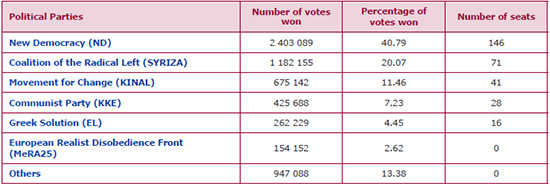Results
Elections in Europe
Corinne Deloy
-

Available versions :
EN

Corinne Deloy
New Democracy (ND), the party led by outgoing Prime Minister Kyriakos Mitsotakis, secured a huge victory in the general elections held on 21 May in Greece, winning 40.79% of the vote and 146 of the 300 seats in the Vouli (-12 compared to the previous general elections of 7 July 2019), the single chamber of Parliament. The party narrowly failed to win an absolute majority of 151 seats. New Democracy won in all regions of Greece except for the Rhodopes, located in the north-east of the country. The Coalition of the Radical Left-Progressive Alliance (SYRIZA), led by former Prime Minister (January-August 2015 and September 2015-July 2019) Alexis Tsipras, suffered a severe defeat, obtaining 20.07% of the vote and 71 elected members (-15), far below what the latest opinion polls had predicted. The Panhellenic Socialist Movement-Movement for Change (PASOK-KINAL), chaired by Nikos Androulakis, can also be satisfied with its result. With 11.46% of the vote and 41 seats, it doubled its number of elected representatives (+19). The Communist Party (KKE), led by Dimitris Koutsoumbas, took the fourth place in the elections: 7.23% of the vote and 28 elected seats (+13). The Coalition of the Radical Left-Progressive Alliance is therefore struggling and has lost many deputies while two other left-wing forces, the Panhellenic Socialist Movement-Movement for Change and the Communist Party, have made gains. Some of Alexis Tsipras' voters may not have forgiven him for implementing strict austerity measures during his four years in power, even though he was elected on the rejection of the latter policies. "Alexis Tsipras lost votes on the left to small parties formed by defectors from his own movement and to the Communist Party and he failed to convince voters in the centre," said Manos Papazoglou, professor of political science at the University of Peloponnese. "Alexis Tsipras does not have a very stable electorate and the opposition to the conservative government over the past four years has been rather weak," said Filippa Chatzistavrou, associate professor of political science at the University of Athens. Greek Solution (EL), an ultra-nationalist radical right-wing party founded and led by Kyriakos Velopoulos, won 4.45% of the vote and 16 seats. On the other hand, the European Realist Disobedience Front (MeRA25), the radical left party of former finance minister (January-July 2015) Yanis Varoufakis, failed to pass the 3% vote threshold required to be represented in parliament and lost its 9 MPs. Turnout was slightly higher than in the previous general elections on 7 July 2019: it was 60.92%, or +3.14 points.
Results of the 21 May 2023 general elections in Greece
Turn out: 60.92%

Source : https://ekloges.ypes.gr/current/v/home/parties/ "New Democracy has won the approval of the Greek people to govern with an absolute majority. This political earthquake, this indisputable victory spurs us on. Only a strong government can carry out bold reforms," said the Prime Minister after the results were announced. He said he wanted to make Greece "a stronger country with an important role in Europe" adding "We are voting for our future, for more and better jobs, for a more efficient health system". Although the majority of Greeks in recent opinion polls were satisfied with the way their country is being governed, the scale of New Democracy's victory may come as a surprise. It had not been anticipated by the opinion institutes. "The improvement of the economic climate is an important card for the ruling party. In the last two years, the Greek economy has recovered strongly, exports have increased impressively, while attracting international business activities with high added value," said Manos Matsaganis, professor of public finance at the Polytechnic University of Milan. "The logic of stability has won over Greeks who have been traumatised by years of economic crisis. Voters did not believe in the possibility of a coalition government, which is not in Greek culture," said Manos Papazoglou, a political scientist. "Greek political parties do not have this culture, especially since Greeks have unpleasant memories of past coalitions," said Constantinos Filis, director of the Institute of International Relations. The head of government called ND's victory a "political earthquake" and said its result was "proof that New Democracy has the green light from the people to govern alone". "Together, we will fight tomorrow so that in the next elections what the citizens have already decided, namely an autonomous New Democracy, will be mathematically confirmed," said the Prime Minister, referring to the organisation of new general elections. Following the elections on 21 May, the President of the Republic, Ekaterini Sakellaropoulou, will entrust the leading party with the task of forming a government. It has three days to do so. If it fails, the Head of State will ask the party that came second to form a government, and if it fails again, the party that came third. If they all fail, a new general election will be called in the following weeks, at the latest in early July, as the current parliament's term ends on 7 July. Kyriakos Mitsotakis, who has ruled out forming a coalition anyway, will refuse to form a government, so new elections will be held with a new voting system. Full proportional representation will be replaced by a new electoral system adopted under Kyriakos Mitsotakis' mandate in which the leading party gets a bonus of up to 50 additional seats, allowing it to obtain an absolute majority and form a stable government.
On the same theme
To go further
Elections in Europe
Corinne Deloy
—
4 November 2025
Elections in Europe
Corinne Deloy
—
28 October 2025
Elections in Europe
Corinne Deloy
—
14 October 2025
Elections in Europe
Corinne Deloy
—
7 October 2025

The Letter
Schuman
European news of the week
Unique in its genre, with its 200,000 subscribers and its editions in 6 languages (French, English, German, Spanish, Polish and Ukrainian), it has brought to you, for 15 years, a summary of European news, more needed now than ever
Versions :



